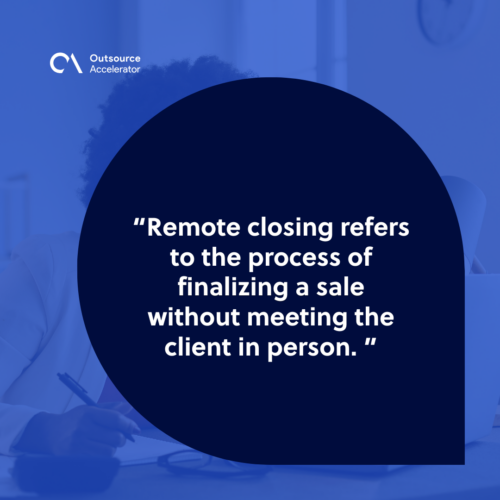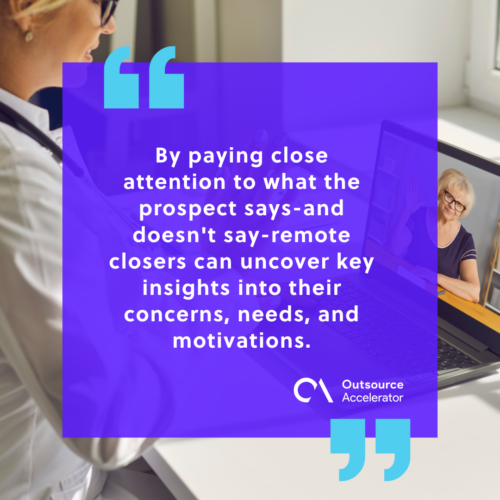8 remote closing techniques to win virtual sales conversations

Closing a sale is often seen as the final hurdle in the sales process, but in reality, it’s where the magic happens. It’s the moment when months of effort, relationship-building, and nurturing culminate in a signed deal.
For sales professionals, mastering the art of closing is crucial, as it directly impacts the bottom line.
But sealing the deal is rarely straightforward. It involves overcoming objections, managing client expectations, and knowing exactly when to ask for the commitment.
This is especially true in today’s digital-first world, where many sales teams have had to adapt to virtual selling and practice remote closing.
Remote selling provides flexibility and access to more clients. However, it also comes with challenges, like building rapport without face-to-face interaction and keeping momentum in a virtual setting.
In this article, we’ll explore eight remote closing strategies designed to help companies fill their sales pipeline with successful transactions.
What is remote closing?
Remote closing refers to the process of finalizing a sale without meeting the client in person.
Sales professionals communicate with prospects using digital tools such as video calls, emails, phone calls, and messaging platforms. They address clients’ concerns and guide them through the decision-making process.
The goal is to close the deal and secure the sale, all while managing the entire transaction remotely.
This approach has become increasingly popular, especially with the rise of digital communication and the shift toward remote work.
Remote closing allows sales teams to reach a broader range of clients across different locations.

Role of a remote closer in sales
A remote closer is a sales professional who specializes in conducting sales transactions without face-to-face interactions.
Here’s a breakdown of the primary tasks of remote closing specialists:
- Build trust and rapport. Remote closers establish a strong relationship with prospects through virtual communication. They are trained to keep clients feeling comfortable, supported, and confident in the buying process.
- Understand client needs. They actively listen and ask questions to uncover the client’s pain points and customize solutions that align with their needs.
- Overcome objections. These sales professionals address any doubts or objections prospects may have, providing clear, persuasive responses to move the deal forward.
- Guide the final decision. They confidently lead the prospects through the closing process, using digital tools to present proposals, negotiate terms, and secure the sale.
Each of these roles requires a combination of strong communication skills, tech-savviness, and the ability to build connections remotely.
8 remote closing strategies to seal deals
Closing a sale remotely presents unique challenges, but with the right strategies, sales professionals can effectively guide consumers toward the final commitment.
Below are eight remote closing strategies for successful sales transactions:
1. Utilize video calls to build rapport
Video calls are the next best thing to in-person meetings. They’re utilized in remote closing to establish a personal connection, interpret body language, and build trust with prospects.
To project confidence and reliability during the conversation, it’s essential to be well-prepared, with a professional backdrop and good lighting.
2. Engage with active listening
Remote closers must be exceptional listeners. By paying close attention to what the prospect says—and doesn’t say—they can uncover key insights into their concerns, needs, and motivations.
Responding thoughtfully and showing empathy can strengthen the relationship and keep the conversation moving forward.

3. Leverage email and follow-up sequences
A well-crafted email can be a powerful tool for closing deals. After a call, remote closers should send a recap of the discussion, highlighting the next steps and key value propositions.
Timely follow-up emails with additional resources or answers to lingering questions help demonstrate commitment and professionalism, nudging the prospect closer to a decision.
4. Ask questions that uncover needs and objections
In remote closing, open-ended questions are a great way to gain insight into a prospect’s challenges, goals, and objections. These questions allow them to address concerns before they become roadblocks.
Closers can tailor their pitch and present solutions that feel like the perfect fit by focusing on the prospect’s pain points.
5. Create urgency with time-sensitive offers
To encourage prospects to act quickly, remote closers can introduce urgency into the conversation. This might include limited-time offers, discounts, or bonuses.
A well-timed nudge can motivate prospects to make decisions sooner without feeling pressured.
6. Offer social proof and testimonials
Sharing client testimonials, case studies, or success stories helps remote closers build trust and credibility.
When prospects see how others have benefited from the product or service, they feel reassured and more confident in moving forward with the deal.
7. Provide a clear, easy-to-understand proposal
In remote closing, clarity is very important. Proposals should be simple, clear, and free of jargon, outlining the product’s value, pricing, and next steps in a straightforward manner.
A visually appealing and easy-to-understand proposal reduces confusion and helps prospects see the benefits of taking the next step.
8. Bag that deal with a confident, direct close
Once all concerns have been addressed and the offer has been presented, remote closers should ask for the sale directly and confidently.
Be clear about the next steps, whether it be scheduling a contract signing or collecting payment details. This reinforces the decision-making process and helps ensure the deal is finalized smoothly.
Transform sales process with expert remote closing tactics
Remote closing has become essential for any sales team looking to stay competitive and close more deals.
The techniques mentioned above help sales professionals transform their approach, overcome virtual selling challenges, and foster stronger connections with prospects.
With the right strategies in place, remote closing can not only streamline the sales process but also drive consistent results and business growth.
Businesses also have the option to offshore outbound sales to premier third-party solutions providers like Clark Staff, ensuring efficiency and scalability.







 Independent
Independent




